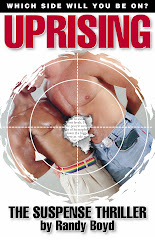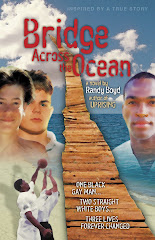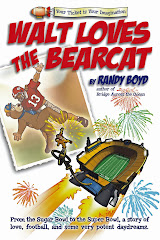While hunkering down in my home, I received a phone call from David Kalmansohn, a
 most-fantastic editor at Frontiers Newsmagazine, who wanted to know, a) if I was all right, and b) whether or not I wanted to write a piece about the uprising taking place in our city.
most-fantastic editor at Frontiers Newsmagazine, who wanted to know, a) if I was all right, and b) whether or not I wanted to write a piece about the uprising taking place in our city.At the time I was working on my novel Uprising, which centered around an assassination plot. During the riots, I put it aside, having suddenly lost my appetite for fictional violence.
However, writing about the nonfictional violence happening in our city was a good distraction from watching and waiting to see if it was going to reach my front door. Or window.
Thankfully, the violence never reached my immediate world. Thanks to Mr. Kalmansohn, the following essay was published shortly after the riots in the May 22, 1992 issue of Frontiers Newsmagazine.
Sometimes I Forget I'm a Nigger ...
You know, one of those people with big lips and charcoal skin who are always up to no good, members of a less intelligent race who would sooner stick a gun in your gut before making a positive contribution to the world.
No doubt my memory lapse is due to the fact that, as I evolve with my sexuality, I willingly
 become more identified with being gay. No doubt it is also because I have achieved a slice of the American Dream, however small: college education, good job, safe dwelling, well-to-do friends.
become more identified with being gay. No doubt it is also because I have achieved a slice of the American Dream, however small: college education, good job, safe dwelling, well-to-do friends.No doubt it is also due to a desire to suppress pain that goes even deeper than what I have endured as a gay man, for I knew I was black long before I knew I was gay. Even when I bought into society's belief that I should be ashamed of both qualities, I could hide my gayness, but not my blackness.
"Wherever I go, I can't get away from having labels and stereotypes hung around my neck."
All of these things contribute to me forgetting I'm a nigger. But not for long. Something always happens to remind me I am a part of America's most historically feared and hated subculture.
Like when I was a freshman at USC at the dawn of the '80s. Fresh off the boat from the Midwest, bursting with dreams of the all-American college life, I was walking by the Sigma Chi fraternity house late one night during my first week of school when a burly anonymous voice from behind a dark window called me nigger.
 Like every time I'm alone in an elevator with a white female and I can feel the tension breathing from her pores and see the fear in her downcast eyes, making me want to say, “Hey, not every black man wants to rape and/or rob you.”
Like every time I'm alone in an elevator with a white female and I can feel the tension breathing from her pores and see the fear in her downcast eyes, making me want to say, “Hey, not every black man wants to rape and/or rob you.”Like in West Hollywood, where many men will cruise anything with a heartbeat, but look right through me because my tan is permanent. It is there where white friends seen out with me have been called “nigger-lover” the next day at the Athletic Club.
It is on Santa Monica Boulevard where pretty boys speeding by in convertibles have shouted racial epithets to me as I strolled down “our” street. And it is in West Hollywood where I have ignored and been ignored by other black gays, each of us internalizing the racism perpetrated against us.
Yet wherever I go, I can't get away from having labels and stereotypes that have little to do with me hung around my neck. Strangers constantly approach me, eagerly asking if I'm an athlete. When I say no, they're disappointed and usually have no further use for interaction, save informing me I should play sports, what with my height and body structure."For every ounce of prejudice hurled my way, my brothers in South Central live it tenfold."
What if I want to be a cheerleader? A brain surgeon? A writer? What these people are really saying: the only worthwhile black man in society is the athlete, whose value lies in his ability to entertain with uncanny feats of physicalness.
 The stereotyping isn't confined to non-blacks. Recently, outside a local basketball arena, a black cop out to catch scalpers accosted me when, from a distance, he saw two white friends of mine handing me money. Brutishly he warned me about selling tickets to these two as if that were the only possible association between two whites and one black.
The stereotyping isn't confined to non-blacks. Recently, outside a local basketball arena, a black cop out to catch scalpers accosted me when, from a distance, he saw two white friends of mine handing me money. Brutishly he warned me about selling tickets to these two as if that were the only possible association between two whites and one black.To exonerate myself, my friends had to give the cop my full name, then I had to produce ID to prove we all knew one another. Made me feel like a nigger.
Perhaps the ultimate reminder of who I am came in the Rodney King verdict and subsequent riots. For every ounce of prejudice hurled my way, my brothers and sisters in South Central live it tenfold.
For me the prejudice is somewhat sanitized. In elevators of friendly office buildings. On the clean streets of Boys Town. For most blacks, the disease of racism festers in every cell of their existence in an uglier, suffocating manner."This form of social outcry also exacts a personal toll."
You grow up in blighted, roach-infested trenches. Your schools do little to prepare you for college. Or life. Your reality of America is not that you can grow up to be anything you want to be. Becoming the president of IBM isn't an option. Neither is being an astronaut at NASA or an executive at Paramount.
Sure, a few have reached these lofty places and live like the Huxtables, but to the boys and girls
 growing up in the South Centrals of this country, reality is “you're black, you're not wanted here and we're going to keep you in your place in the ghetto.”
growing up in the South Centrals of this country, reality is “you're black, you're not wanted here and we're going to keep you in your place in the ghetto.”Reality is life and death in a war zone created by poverty created by a system that never cared enough about them. Reality is an ingrained fear of the law and police, a fear fueled by a history of the courts literally letting whites get away with murder against blacks.
Given this bleak picture, and given the turn for the worse for minorities under Reagan-Bush, is it any surprise that something snapped when a suburban jury let four cops go even after their crimes had been captured on video? Not to anyone with a finger on the pulse of the poor, tired and hungry. Not to any student of history.
This is what happens when people are oppressed. You can keep them down, kick them and beat them for so long, but eventually they will rise up and say “Enough!” in the only way that seems to get attention: violence. It's history. In 19th-century France. In Colonial America. In hotbeds of dispute all over the world today. It seems to be the law of man.
It was this perverse sense of “I told you so” that danced with the sadness and fear within me as I
 watched the burning and destruction, neither condemning nor endorsing the mayhem, but understanding that the rioters were really saying, “We want in on the American Dream.”
watched the burning and destruction, neither condemning nor endorsing the mayhem, but understanding that the rioters were really saying, “We want in on the American Dream.”Even the looters were saying this by their actions, most of them symbolically grabbing something, anything, for free as if taking a spiteful swipe at an America that is constantly pumping their heads full of images of sexy, material wealth always just out of reach.
But this form of social outcry also exacts a personal toll. I think of my barber shop of over 10 years, in the heart of the neighborhood near the rich white bastion known as USC.
On the third day of the riots, as the TV reporter rummaged through the heavily looted strip mall containing that shop, the tears which had been welling up in my eyes for three days finally came cascading down. I cried for Nick, my barber for nearly a decade, who cut my hair for next to nothing when I was a starving Trojan, and from whom you could still get a good haircut and a rambunctious dose of ghetto gossip for only nine bucks.
 Twice a month it was my way of keeping in touch with the Indianapolis inner city I knew for the first seven years of my life before my family moved to the 'burbs. Surrounded by the distinctive flavors and rhythms of urban life, I listened to barbers and customers alike going on about a son's baseball game, a friend's newborn baby, Bush vs. Clinton or the Lakers or the Raiders. Nick and his fellow barbers staked their lives on those nine dollar haircuts, working up to 12 hours a day, six days a week. For now, no more.
Twice a month it was my way of keeping in touch with the Indianapolis inner city I knew for the first seven years of my life before my family moved to the 'burbs. Surrounded by the distinctive flavors and rhythms of urban life, I listened to barbers and customers alike going on about a son's baseball game, a friend's newborn baby, Bush vs. Clinton or the Lakers or the Raiders. Nick and his fellow barbers staked their lives on those nine dollar haircuts, working up to 12 hours a day, six days a week. For now, no more.During the fiercest days of battle, I was struck by how many white people, friends and strangers, told me I had nothing to be worried about: I was safe. As if my property and my body weren't capable of perishing in the random fires and chaotic hail of bullets.
Was there anyone in LA who wasn't scared that the violence and flames would flare up on his or her block? Is there anyone who believes it can't reach his or her backyard the next time?
The riots (and the oppression and racism that caused
 them) affect us all. The sphere of the subject is so vast and varied that to address all its aspects in a few hundred words is impossible. Still, one overwhelming concept resonates through the smoke: As long as blacks continue to be oppressed, the country will continue to live under a smoldering threat of violence.
them) affect us all. The sphere of the subject is so vast and varied that to address all its aspects in a few hundred words is impossible. Still, one overwhelming concept resonates through the smoke: As long as blacks continue to be oppressed, the country will continue to live under a smoldering threat of violence.And blacks will continue to be oppressed as long as racist attitudes prevail. As along as eager freshmen at USC are called niggers by their classmates. As long as many of the GWMs of West Hollywood discriminate against people of color. As long as the government systematically keeps most blacks in the ghetto. In other words, (to borrow the other King's phrase), as long as we all continue to look at people by the color of their skin and not the content of their character.
POSTSCRIPT 2009: Elderly White Man to Young Black Man: Help!
During the riots, an elderly white man who was in distress in the middle of an intersection cried out to me, pleading for my help as my car idled at the stoplight. I now had a choice: get out, get involved and help the old man, or ignore his pleas in the name of getting home safely before the impending citywide curfew.
Helping the old man meant putting myself at risk, not only from getting out of my car and walking in the middle of a somewhat busy intersection: my black ass doing anything on behalf of a white man in a racially-divided, powder keg of a war zone seemed like a bad idea.
Still, an even worse idea was that of me not helping an elderly man alone and in distress. And
 what might happen had I not helped. So I got out of my car and helped him push his car to the side of the road. For his distress was not from being attacked by angry black people. His distress was due to car trouble, and he simply needed help getting the huge old clunker out of harm's way until his backup arrived.
what might happen had I not helped. So I got out of my car and helped him push his car to the side of the road. For his distress was not from being attacked by angry black people. His distress was due to car trouble, and he simply needed help getting the huge old clunker out of harm's way until his backup arrived.As I pushed the car through the intersection, the old white man steering in the driver's seat, images flashed in my mind: black people, white people, cops, whomever, looking at the two of us, misinterpreting the situation and starting another flashpoint of confusion in our racially-divided, powder keg of a war zone.
Fortunately, all remained peaceful. After the elderly white man thanked me, I went on my way, realizing neither one of us had even mentioned the rioting and racial tensions surrounding us.














